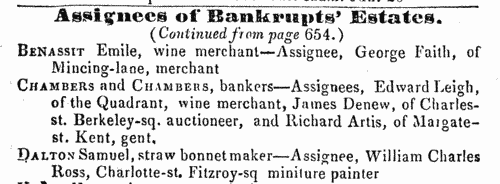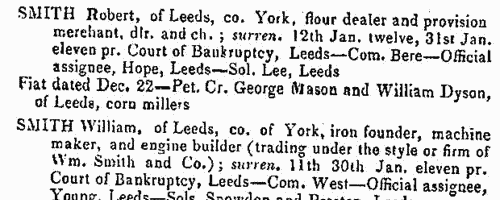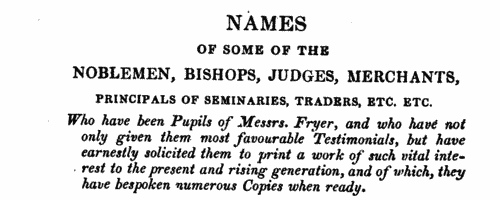Chandley Surname Ancestry ResultsOur indexes 1000-1999 include entries for the spelling 'chandley'. In the period you have requested, we have the following 59 records (displaying 41 to 50): Single Surname Subscription | | | Buying all 59 results of this search individually would cost £488.00. But you can have free access to all 59 records for a year, to view, to save and print, for £100. Save £388.00. More... |
These sample scans are from the original record. You will get scans of the full pages or articles where the surname you searched for has been found. Your web browser may prevent the sample windows from opening; in this case please change your browser settings to allow pop-up windows from this site. Insolvents
(1838)
Insolvency notices for England and Wales: insolvency often caused people to restart their lives elsewhere, so these are an important source for lost linksCHANDLEY. Cost: £6.00.  | Sample scan, click to enlarge

| Bankrupts' Assignees
(1840)
Assignees of bankrupts' estates (usually principal creditors and/or close relatives of the bankrupt) in England and WalesCHANDLEY. Cost: £6.00.  | Sample scan, click to enlarge

| Bankrupts
(1842)
Bankruptcy notices for England and Wales: bankruptcy often caused people to restart their lives elsewhere, so these are an important source for lost links
CHANDLEY. Cost: £6.00.  | Sample scan, click to enlarge

| Dividends of bankrupts' estates
(1842)
Dividends from moneys raised from bankrupts' estates in England and WalesCHANDLEY. Cost: £6.00.  | Sample scan, click to enlarge

| Bankruptcy Meetings
(1843)
Meetings about bankrupts' estates in England and WalesCHANDLEY. Cost: £6.00.  | Sample scan, click to enlarge

| Subscribers to Willcolkes and Fryers' Arithmetic: Warrington
(1843)
'The United New and Much Admired System of Arithmetic and Mental Calculations, of Doctor Willcolkes and Messrs. T. and T. W. Fryer; Being the Result of Many Years’ Study. Eighth Edition, Much Enlarged and Carefully Revised' was published in 1843 in Derby. The list of subscribers includes sections for Ashton, Beverley, Boston, Dewsbury, Doncaster, Grantham, Halifax, Heckmondwike, Huddersfield, Hull, Ireland, Leeds, Lincoln, Liverpool, Manchester, Newark, Oldham, Rochdale, Rotherham, Sheffield, Stalybridge, Stamford, Stockport, Wakefield, Warrington, as well as separate lists of bankers and principals of seminaries. More precise addresses are rarely given, christian names hardly ever.
CHANDLEY. Cost: £4.00.  | Sample scan, click to enlarge

|  British infantry fighting in China
(1860) British infantry fighting in China
(1860)
The China Medal was awarded to soldiers and sailors who took part in the prosecution of the war against the Chinese from 1856 to 1860. Separate clasps were awarded for men who had been in receipt of the China Medal of 1842; for being actually present at Canton on 28 and 29 December 1857, when that city was bombarded and finally captured; for being actually engaged in the operations which ceased with the first capture of the Taku Forts, 20 May 1858, and led to the Treaty of Tientsin; for being actually present at the capture of the Taku Forts 21 August 1860; and for being actually present before Pekin the day the gate of that city was given up to the allied (British and French) army, viz. on 13 October 1860. The 99th (Lanarkshire) Regiment of Foot, based at Cork, embarked for India in September 1858, and was transferred to China in 1860; moved to South Africa in 1865, and returned to England in 1869. The regiment took part in the capture of Pekin.CHANDLEY. Cost: £8.00.  | Sample scan, click to enlarge

| Long-stay Paupers in Workhouses: Stockport
(1861)
This comprehensive return by the Poor Law Board for England and Wales in July 1861 revealed that of the 67,800 paupers aged 16 or over, exclusive of vagrants, then in the Board's workhouses, 14,216 (6,569 men, 7,647 women) had been inmates for a continuous period of five years and upwards. The return lists all these long-stay inmates from each of the 626 workhouses that had been existence for five years and more, giving full name; the amount of time that each had been in the workhouse (years and months); the reason assigned why the pauper in each case was unable to sustain himself or herself; and whether or not the pauper had been brought up in a district or workhouse school (very few had). The commonest reasons given for this long stay in the workhouse were: old age and infirm (3,331); infirm (2,565); idiot (1,565); weak mind (1,026); imbecile (997); and illness (493). CHANDLEY. Cost: £6.00.  | Sample scan, click to enlarge

| Debtors, Insolvents and Bankrupts
(1880)
Bills of sale (binding assets to a creditor/lender), insolvencies and bankruptcies in England and Wales, January to March 1880CHANDLEY. Cost: £6.00.  | Sample scan, click to enlarge

| Money lenders and other creditors
(1880)
Bills of sale transferred title in all property of a debtor to a specified creditor. Possession of a bill of sale thus protected a money lender or other creditor from losing a debtor's property to other creditors (except landlords) in case of insolvency or bankruptcy; and in many cases signing a bill of sale was a required step for a borrower securing a loan. The bill of sale specified the amount thereby secured, but could be open, i. e., allow for further drawings on the same account. Entries from the official register of bills of sales in England and Wales were published in Flint & Co.'s London Manchester and Dublin Mercantile Gazette, a weekly publication available only by subscription, issued under the motto "Security in Crediting". The entries are listed by county, then alphabetically by debtor, surname first, with address, trade, the name of the creditor ('in whose favour'), dates of issue and filing, and amount. An &c. after the amount indicates an open bill. The creditors that appear in the 'in whose favour' column are mainly, but not exclusively, loan companies and individual money lenders, and Jewish names figure prominently among the latter. When a loan was paid off, satisfaction of the bill of sale was entered on the register, and these satisfactions are also recorded in these pages. 1 January to 31 March 1880.CHANDLEY. Cost: £6.00.  | Sample scan, click to enlarge

|
Research your ancestry, family history, genealogy and one-name study by direct access to original records and archives indexed by surname.
|













